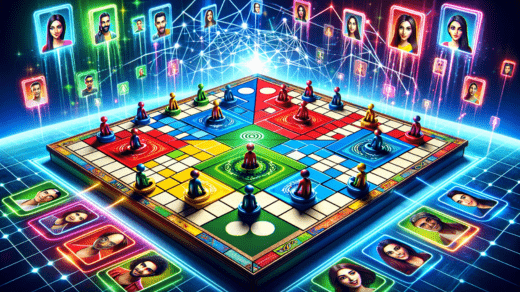Introduction:
Ludo, a classic board game that has stood the test of time, holds a special place in the hearts of millions across India. A game of strategy, luck, and social interaction, Ludo is a staple in Indian households, bringing families and friends together for hours of fun. In this comprehensive guide, we will delve into the intricacies of Ludo gameplay, strategies, and tips to help you master this timeless classic.
Understanding the Basics:
Ludo, derived from the ancient Indian game of Pachisi, involves moving four tokens around the board to reach the center. Each player has a unique colored set of four tokens, and the race to the finish line is determined by the roll of the dice. The game is simple yet strategic, making it accessible to players of all ages.
Strategic Token Placement:
One key aspect of mastering Ludo is understanding the importance of strategic token placement. At the start of the game, players often face the dilemma of whether to focus on advancing a single token or spreading their moves across multiple pieces. While there’s no one-size-fits-all strategy, a balanced approach tends to work well. It’s crucial to consider the advantages of having multiple tokens in play, providing flexibility and options based on the dice rolls.
Optimizing Dice Rolls:
The element of luck in Ludo is inherent in the roll of the dice. However, skilled players know how to optimize their moves based on the outcomes of their rolls. For instance, landing on a square occupied by an opponent sends their token back to the starting point, presenting an opportunity to strategize and block opponents’ progress. Additionally, understanding the probabilities of different dice outcomes can influence your decision-making, giving you an edge in the game.
Teamwork in Team Ludo:
In India, Ludo is often played in teams, adding another layer of strategy and camaraderie to the gameplay. Teammates must coordinate their moves to maximize their chances of victory. Communication is key, as players strategize together to navigate the board and protect each other’s tokens. Successful teamwork in Team Ludo requires trust, coordination, and a shared understanding of the game’s dynamics.
The Art of Blocking:
An essential strategy in Ludo is the art of blocking opponents. When a player has multiple tokens near the finish line, it becomes crucial for others to strategically position their tokens to block their path. This not only hinders their progress but also creates opportunities for your tokens to advance. The ability to effectively block opponents while maintaining your own progress is a skill that sets experienced players apart.
Adapting to Changing Dynamics:
Ludo is a dynamic game where the tide can turn with a single dice roll. Adapting to changing dynamics is a key skill in mastering Ludo gameplay. Whether it’s facing setbacks or capitalizing on unexpected opportunities, staying flexible and adjusting your strategy based on the evolving game situation is essential for success.
The Social Aspect:
Beyond its strategic elements, Ludo is cherished for its social aspect. It serves as a platform for bonding, laughter, and friendly competition. Now, for the Ludo-lovers, many ludo real money games are available providing them with a chance to earn real money on playing it. In India, it’s common to find families and friends gathering for Ludo sessions during festivals, holidays, or casual get-togethers. Embracing the social aspect of the game enhances the overall experience and makes it a cherished tradition.
Conclusion:Ludo continues to capture the hearts of players across India, transcending generations and fostering social connections. Mastering Ludo requires a combination of strategic thinking, some Ludo tips and tricks, adaptability, and a bit of luck. As you roll the dice and navigate the board, remember that the essence of Ludo lies not just in winning but in the joy of playing and creating lasting memories with those you hold dear. So, gather your tokens, sharpen your strategies, and embark on a journey of Ludo mastery that transcends generations.

